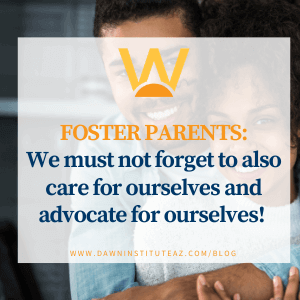Throughout the month of May, we have discussed our foster care system, including the needs and the challenges that families find themselves confronted with. The joys that occur through the process of becoming and being a foster parent are numerous. The need for more and more foster families cannot be denied. Those that choose this path find that bringing a chid into their home is a different experience than they ever expected. There are so many different factors that play into this, which include: what moved the foster parent to begin fostering, what type of family dynamic already exists in the foster home, and what are the individual needs of the children being placed in the home. Due to these factors, and many others, foster parents need as much support as any serving volunteer or professional. Our call to service as parents and families should not go unnoticed but instead should be supported, recognized, and appreciated.

In the beginning of becoming a foster parent we receive education to be a foster parent, and we receive support from our licensing agency regarding the requirements and expectations of our new role. We are inundated with information, and due to this are often overwhelmed by how much information is available. What we must not forget, is that there are resources and information available! When a child is placed in the home, sometimes we forget why all those resources and supportive services exist, as our focus is on the child in our care, and how to transition to our changing environment. Our own self-judgment and emotions come into play when caring for a child, and our expectations of how we should be doing as a caregiver and advocate for this child. We must not forget to also care for ourselves and advocate for ourselves! By meeting our needs as foster parents, we are able to better meet the needs of the children in our care.
So before seeking out more support, please remember to seek out the support of those professionals already involved:
- Licensing Worker: The job of the licensing worker is to ensure that you and your home meet the requirements afforded by the state to care and nurture a foster child, who is awaiting the permanency of a stable situation either through reunification or adoption. To do this job well, the licensing worker supports the foster parent in ensuring their needs are being met, which includes educational needs, resources to meet needs, or resources for the child in care. They are our link to other agencies, and they are there to link us to support when we may be feeling overwhelmed by our role.
- Behavioral Health Case Manager/Therapist: In the few weeks following the placement of a child, many foster parents are required to seek out services at their behavioral health agencies to meet the social and emotional needs of the child in their care. Do not take this lightly, even if in that first week your placement is doing splendid. The removal from their family environment is still a change and a transition, and the honeymoon period is often wonderful. These professionals can help you with acquiring the knowledge to better meet the needs of the children in your care. Also, depending on the situation of the placement these professionals can help you support the changing dynamic of your household, and how to respond appropriately to these changes.
- DCS Case Manager: The number one job of the DCS Case Manager is to ensure the safety and well-being of the child in your care. We need to advocate about our needs and the child’s needs to these professionals as well. Why? Even if they are not able to provide direct support to meet your needs, they may have resources and referrals to provide you to get the help that is needed to ensure the appropriate care of the child in your home.
Now, this does not mean that you do not seek support and care from others outside of these individuals, but remember that these professionals are meant to serve you and the children in your care. Also, do not forget the natural supports you have acquired over time, like friends, family, and coworkers. Sometimes, they may not understand the situation, but they know us, and by knowing us they may know the support we need better than any other professional.
I believe there is always more support that can be given to our foster parents and families, and I believe the needs of the foster parent are often overlooked in the child welfare system. However, there are agencies that recognize this need and have afforded more support and advocacy to care for foster families. One of the areas, I feel still goes unrecognized is the grief/ loss that takes place for every foster parent when a child is reunified or adopted outside of the foster family. Many of us are building strong connections with the children placed in our home, and to see them leave can be heart wrenching. Please make sure to recognize the impacts of this on your well-being and provide yourself with space to practice self-care for healing. This can be a great resource so that you build resiliency to continue supporting your family, and supporting the future children who will come into your home. If the feeling of loss/grief is great, make sure to seek out your own therapeutic services, so that you can refill your cup and give to those children who are the most vulnerable.
Finally, here are some resources in the Phoenix area for foster parent support:
- Foster Care Initiatives-http://www.fostercareinitiatives.org – An organization that provides support and resources to foster parents and children who need support to overcome challenges.
- AZ Helping Hands-https://azhelpinghands.org – An organization that provides donations for new placements, or children within foster care settings to have belongings of their own, or receive scholarships for extracurriculars so they can participate in life as any child should be able to.
- Arizona Friends of Foster Care https://www.affcf.org -This foundation provides for children in foster care by using charitable donations to fund activities and scholarships.
Thank you for your continued service for those of you who have chosen the path toward becoming a foster parent, or are in this journey. Thank you to those reading this who are aware that the need to support our foster parents is necessary. Thank you for those who place the welfare of our children as a top priority!

